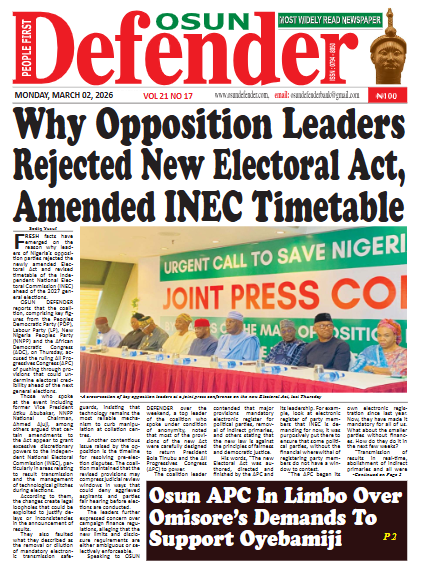PEPT Judgment: Much Ado About Nothing as Atiku and Obi Head to Supreme Court, By Oluwaseun Abosede

Political judgments should not be swayed by emotions but by the ability of the petitioners to substantiate the facts of their cases against INEC and the declared candidate. The recently delivered Presidential Tribunal judgment, in which the petitioners lost, underscores this point.
To a significant extent, there is nothing surprising about the judgment issued by the Presidential Election Petition Tribunal (PEPT) for those who have closely followed the proceedings with an open mind or have a historical understanding of events dating back to the President Olusegun Obasanjo era.
The outcome of the PEPT Judgment is not a departure from the historical patterns of election judgments in Nigeria. A look back at the eras of Obasanjo, Yar’adua, Jonathan, and Buhari doesn’t reveal significant differences or worse outcomes than what we’ve seen in the past. It’s important to note that in the case of presidential elections in Nigeria, as in many parts of the world, the court serves not only as a Court of Law but also as a Court of Order.
Following a review of the budget proposals submitted by the 23 Departments and Directorates of the Electoral Commission, the document revealed the Commission’s Election Project Plan (EPP) for the 2023 general election indicates that INEC will need N305 billion to conduct the 2023 election, which is now being challenged in court. Globally, the average Cost per Registered Voter Index (COVI) in transitional democratic elections ranges from $4 to $8. Nigeria set its cost at $5.39, roughly equivalent to ₦4,255, with the goal of accommodating 100 million registered voters for the election. The Commission’s EPP document quoted a budget of ₦304.54 billion for the election, excluding any additional supplementary budget. Let’s consider this together: how feasible would it have been to dismiss these expenditures, order a costly rerun, or declare another winner, thereby plunging the entire nation into uncertainty, along with the tribal and religious ‘yes daddy’ period and divisions of the past?
Beyond the financial aspect, the heart of the litigation itself lies in the fact that the five PEPT Justices unanimously agreed that the petitioners had failed to provide substantial evidence to support their claims, whether against INEC or against the 2nd respondent, President Bola Ahmed Tinubu. The petitioners had prayed for his disqualification from the presidential election under Sec 137 (1)(d) of the 1999 constitution, citing a $460,000 forfeiture of the winner by a district court in Illinois.
In summary, the Justices made the following points:
- The petitioners did not make any credible evidence available to the court, seemingly expecting the court to collect evidence from the streets or the market, or to be influenced by threats on social media. This is not how the court operates.
- The petitioners’ claim that INEC deliberately closed or blocked its iREV and transmission system to manipulate election results in favor of the second respondent (PBAT) raises the question of whether that allegation has any merit.
- The petitioners failed to specify the number of votes affected and the number of people disenfranchised. It’s inconceivable that they would allege widespread rigging across 176,000 polling units, over 8,000 wards, 774 LGAs, 36 States, and the FCT without pinpointing the specific locations of the alleged irregularities.
- Neither set of petitioners provided any evidence to prove that the results of the presidential election of February 25, 2023, as declared by the 1st respondent (INEC), were incorrect. Moreover, they did not submit even a single polling unit result issued by INEC to their polling unit agents to support their claim of election result manipulation, despite admitting that they had agents in the polling units.
- The FCT is not accorded superior status to a state in the calculation of votes in a presidential election. It holds no special significance in this context.
However, I’m greatly disappointed by their Lordship’s judgment against INEC in one aspect. If INEC, which is empowered by law to electronically transmit election results, failed to do so without providing a cogent reason, the court should not have stated that INEC is not obligated to electronically transmit election results. This decision appears to backtrack on the progress made in the 2022 elections and erodes our democratic values. The justices should have used this opportunity to reprimand INEC and strengthen our democratic principles.
The opposition’s claim that the “Judgment of humans isn’t the judgment of God” has no relevance in this scenario. The same process that declared OBI the winner in Lagos also declared TINUBU the winner in KANO, and similarly, the process upheld ATIKU as the pool winner in Akwa Ibom.
In the end, it’s all “Much Ado About Nothing,” as the Supreme Court is not just a court of law but also a court of order. It is unlikely to pronounce anything contrary to what we have heard from PEPT. At best, it may dress the same conclusions in a more appealing gab.
The opinions expressed in this publication are those of the authors. They do not represent the opinions or views of Osun Defender







